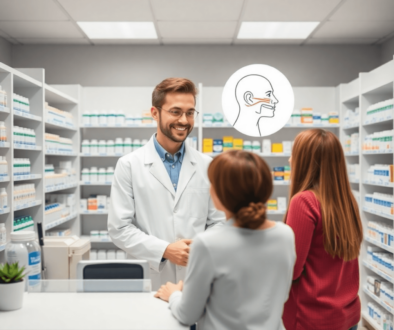What Happens During a Minor Ailment Assessment at Your Local Pharmacy?
In this article, we explore minor ailment assessments at your local pharmacy. Here’s what you can expect:
- Understanding Minor Ailment Assessment: Learn about this important service that can assist with various health issues such as bladder infections, heartburn, and even mental health needs.
- The Importance of Local Pharmacies: Discover the significance of pharmacies in managing everyday health problems, including their role in providing accessible mental health care and handling prescription refills online.
- Going Beyond Medication Dispensing: Find out how pharmacists go the extra mile for their patients by offering valuable advice on managing conditions like ADHD through genetic testing or providing expert guidance on natural remedies for heartburn.
Understanding Minor Ailments
When it comes to minor ailments, local pharmacies are the unsung heroes. Here’s a look into why these little troubles find their perfect match in pharmacy-based care:
Examples of typical minor ailments
From pesky cold sores to stubborn eczema and those pounding headaches, pharmacies handle them all with a smile. They even provide essential treatments for conditions like measles, ensuring comprehensive care.
Why pharmacies are the place to be
These conditions scream out for quick, accessible solutions, making pharmacies the go-to spot for hassle-free care. For instance, if you’re dealing with a vitamin deficiency, pharmacists can administer B12 injections which offer swift relief and effective treatment.
Benefits of timely management
Picture this: swift relief from discomfort, preventing minor issues from snowballing into major dramas, all thanks to timely pharmacist intervention.
So next time you’re dealing with one of these common health hiccups, remember your friendly neighborhood pharmacy is armed and ready to tackle them head-on!
The Comprehensive Process of a Minor Ailment Assessment at Your Local Pharmacy
During a minor ailment assessment at your local pharmacy, pharmacists become health detectives, investigating your symptoms to find the source of your discomfort. Let’s explore this fascinating process step by step:
Step 1: Symptom Assessment by the Pharmacist
- Think of the pharmacist as a medical detective, asking you about your symptoms in detail—this is their area of expertise.
- They will ask you specific questions about the nature and severity of your symptoms, as well as how long they have been bothering you.
- Your medical history and current medications will also be important pieces of information in this investigation. The pharmacist will review them to ensure that any new treatments won’t interfere with your existing medications.
- Safety is the top priority! Every recommendation made is like a protective barrier against unwanted drug interactions. The pharmacist will make sure that the proposed treatment plan is not only effective but also safe for your individual health situation.
When it comes to managing medications, especially for children, it’s essential to approach with caution. For parents navigating this tricky terrain, here’s a guide filled with expert tips on managing children’s medications and dosages safely.
Now you understand that a minor ailment assessment isn’t just a quick conversation at the counter—it’s a thorough examination where every detail counts.
Step 2: Decision Making and Treatment Options
When it comes to the minor ailment assessment process at your local pharmacy, pharmacists rely on specific criteria to determine the most suitable course of action for the patient. This involves assessing whether over-the-counter (OTC) treatment is adequate or if a prescription is necessary based on the severity and nature of the symptoms presented.
Pharmacists with limited prescribing rights may have the authority to recommend and provide prescription medications for certain minor ailments within their scope of practice. For instance, they might prescribe medications for conditions like syphilis, which is experiencing a resurgence. This capability streamlines the process, allowing patients quicker access to the necessary treatment without delays associated with physician consultations.
By leveraging their expertise in [symptom evaluation](https://misterpharmacist.com/uncategorized/managing-allergies-with-over-the-counter-and-prescription-options-in-2025) and medication management, pharmacists can promptly address minor health issues, ensuring patients receive timely and effective care right at their local pharmacy. However, it’s important to note that not all health issues can be resolved with OTC medications. In some cases, such as severe allergies or when exploring non-prescription solutions for weight management support, prescription options may be necessary for effective symptom relief and better living. Furthermore, recent legislative changes such as those outlined in Montana’s SB0112 bill, are expanding the scope of practice for pharmacists, allowing them to play an even larger role in patient care by prescribing medications for a wider range of conditions.
Step 3: Developing a Treatment Plan
In the minor ailment assessment process at your local pharmacy, pharmacists play a crucial role in guiding patients towards optimal health. Here’s what happens during this vital stage:
1. Educating on Medication Use
Pharmacists take the time to explain how to use medications correctly and provide clear dosage instructions. This ensures patients understand their treatment plan thoroughly.
2. Self-Care Tips
Alongside medication advice, pharmacists offer additional self-care measures tailored to the patient’s condition. These tips empower individuals to actively participate in their healing process.
3. Prescription Writing
When within their scope of practice, pharmacists may write prescriptions for suitable treatments, streamlining the path to obtaining necessary medications promptly. If you’re considering switching pharmacies for any reason, it’s important to know how to switch pharmacies smoothly without interrupting your medication schedule with expert tips and practical advice.
By focusing on education, personalized care, and empowering patients with knowledge, pharmacists enhance the effectiveness of treatments and promote better health outcomes. Remember, your local pharmacy is not just about picking up prescriptions; it’s a hub of expert guidance and support for your well-being.
If you ever need to transfer your prescriptions to an online pharmacy for convenience or cost-saving reasons, here’s what to expect when transferring your prescriptions.
Moreover, it’s essential to understand that pharmacists are not just medication dispensers but also valuable resources in the healthcare system. They can guide you through various aspects of your health journey, as outlined in this comprehensive curriculum toolkit designed for RSC (Residential Support Coordinator) training.
Step 4: Follow-Up and Monitoring
In the minor ailment assessment process, follow-up arrangements play a crucial role in ensuring treatment effectiveness and patient well-being:
1. Importance of scheduling follow-ups
Pharmacists prioritize follow-up appointments to track progress and adjust treatment plans if needed.
2. Monitoring progress or side effects
Pharmacists keep a close eye on how patients respond to treatments, ensuring they are on the right path to recovery. For instance, when managing conditions like ADHD, they might monitor the effects of medications such as Vyvanse and Concerta, adjusting dosages as necessary based on the patient’s response.
3. Communication with primary care providers
When necessary, pharmacists liaise with a patient’s primary care provider to provide updates on the assessment and any prescribed medications.
By emphasizing the significance of follow-up care, monitoring patient progress, and facilitating communication with other healthcare professionals, pharmacists ensure comprehensive and effective management of minor ailments.
Step 5: Referral to Other Healthcare Professionals
In the minor ailment assessment process, pharmacists have a diverse role. They not only assess symptoms and review patient history but also look for possible medication interactions. This thorough method guarantees that patients get the best pharmacy-based care.
1. Identifying Red Flags
During the symptom evaluation phase of the minor ailment assessment, pharmacists watch out for any warning signs or worsening symptoms that may point to a more serious underlying condition needing immediate physician attention.
2. Seamless Referrals
When a patient’s symptoms indicate a need for further evaluation beyond what pharmacy-based care can provide, pharmacists ensure a smooth transition to suitable medical providers. This referral process is crucial in effectively managing serious symptoms.
3. Ensuring Patient Safety
Timely escalation of care is vital to ensuring patient safety. By quickly identifying situations where a referral to a physician is necessary, pharmacists play a role in proactive and comprehensive healthcare management for patients.
Benefits of Minor Ailment Services at Your Local Pharmacy
Local pharmacies are not just about filling prescriptions; they also provide essential minor ailment services that come with a multitude of benefits. These services are transforming the way we access healthcare, making it more accessible, cost-effective, and reducing the need for physician visits.
1. Convenience and accessibility of pharmacy-based assessments
Local pharmacies offer a convenient option for quick and easy access to healthcare services without the need for appointments or long wait times. Patients can simply walk in and receive timely assistance for their minor health concerns.
2. Reducing burden on doctors and emergency departments
By utilizing pharmacy services for minor ailments, patients help alleviate the strain on busy primary care physicians and overcrowded emergency rooms. This ensures that those with more urgent medical needs can receive prompt attention while minor issues are efficiently managed at the pharmacy.
3. Improving overall patient quality of life through prompt treatment
Timely management of minor health conditions leads to quicker symptom relief, less discomfort, and faster recovery. By addressing these issues promptly at the pharmacy level, patients can maintain a better quality of life and avoid unnecessary suffering or complications.
These benefits highlight how minor ailment services at local pharmacies play a vital role in providing accessible, cost-effective care while reducing the need for unnecessary visits to physicians or emergency departments.
Common Conditions Managed Through Pharmacy Assessments
Local pharmacists are like mini health detectives, able to help with a surprisingly wide range of minor health issues. When you walk into a pharmacy wondering What Happens During a Minor Ailment Assessment at Your Local Pharmacy?, you can expect their expertise to go beyond just giving you medication.
Here’s a quick overview of common conditions that pharmacists regularly deal with:
- Acne — providing personalized advice and treatments for those stubborn breakouts.
- Coughs and colds — relieving symptoms so you can get back to your busy life.
- Thrush (yeast infections) — offering discreet and effective care without any awkward waiting.
- Allergic rhinitis — managing sniffles and sneezes with precision.
- Fungal infections — from athlete’s foot to nail fungus, pharmacists have the knowledge to help.
- Muscle pain — addressing mild aches with suitable remedies and tips.
- Sleep disorders (mild) — providing guidance on improving sleep habits and suggesting over-the-counter options.
Pharmacists don’t just hand out medications; they also take the time to understand your symptoms in detail, review your medical history, and consider any potential drug interactions before recommending a treatment plan. Their training enables them to safely and efficiently handle this wide range of conditions.
This means that you can receive prompt and personalized care for minor health issues that might otherwise persist or require an unnecessary visit to the doctor. The convenience is undeniable, the knowledge is extensive, and the service is designed to help you keep moving forward—without any hassle.
Training and Professional Expertise Behind the Service
Pharmacists don’t just wing it when managing minor ailments. They undergo specialized training that dives deep into clinical assessment, pharmacology, and patient communication. This isn’t your run-of-the-mill drug dispenser gig—they become experts in identifying symptom patterns, evaluating risk factors, and recommending safe medication management tailored to each individual.
Key elements of pharmacist training include:
- Clinical decision-making: Learning how to differentiate between minor issues and red flags needing urgent medical attention.
- Pharmacotherapeutics: Mastering which medications work best for specific conditions, including dosing and potential side effects.
- Patient history assessment: Understanding existing health conditions and current medications to avoid harmful drug interactions.
Regulatory frameworks provide a solid safety net around this practice. Pharmacists operate within a clearly defined professional scope that ensures treatments are evidence-based and compliant with healthcare laws. These guidelines protect patients by setting boundaries on what pharmacists can prescribe or recommend without a doctor’s referral.
“Training equips pharmacists not only to suggest remedies but also to safeguard your health through thorough evaluation and responsible prescribing.”
This professional expertise transforms your local pharmacy into a frontline healthcare hub where minor ailments meet major competence.
Why Choose MisterPharmacist for Your Minor Ailment Needs?
Looking for a 5-star rated pharmacy in Toronto that actually delivers on its promises? MisterPharmacist, the city’s only local pharmacy boasting top Google reviews, stands out as your best option.
Here’s why switching to MisterPharmacist makes sense:
- Personalized Care: Your symptoms get more than a quick glance. Expect thorough assessments tailored just for you, not cookie-cutter advice. This is part of our commitment to providing personalized pharmaceutical care, which is the future of patient-centered service.
- Streamlined Service: Skip long waits and multiple appointments. What happens during a minor ailment assessment at your local pharmacy? At MisterPharmacist, it’s quick, efficient, and effective.
- Expertise You Can Trust: Pharmacists here are trained to spot when to treat in-house or escalate care—keeping you safe and well-informed.
- Convenience: Located downtown with flexible hours, popping in is easier than ever.
Choosing MisterPharmacist means getting top-tier minor ailment support without the fuss—because your health deserves the best local ally. Whether you need emergency prescriptions delivered fast or are seeking guidance on choosing the right allergy treatment, we are here to help.



